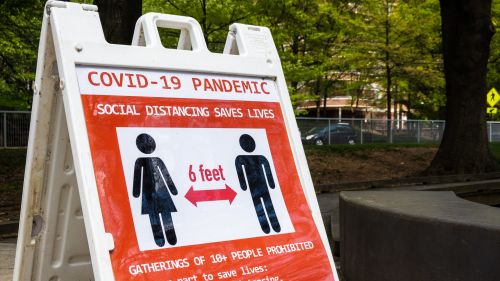Global Public Opinion as US COVID-19 Deaths Top September 11 Attacks

Council experts analyze global public opinion on COVID-19 after deaths in the United States surpassed the deaths from the September 11, 2001 terrorist attacks.
Introduction
The Chicago Council Survey team will continue to provide weekly updates on public opinion around the world on the COVID-19 pandemic. This week, we have updates on public opinion in the United States, Mexico, Canada, South Korea, Japan, Italy, France, and the United Kingdom.
United States
The United States passed a grim milestone this week, as the total deaths from the COVID-19 outbreak surpassed the deaths from the September 11, 2001 terrorist attacks. Dr. Anthony Fauci, director of the National Institute of Allergy and Infectious Diseases, warned this weekend that COVID-19 could kill 100,000 to 200,000 Americans by the time the pandemic runs its course.
As COVID-19 continues to spread across the United States, Americans’ concerns continue to grow. A Reuters/Ipsos poll fielded March 18-24 finds most Americans very (50%) or somewhat (35%) concerned about the spread of coronavirus, a concern that crossed partisan lines. According to a Washington Post-ABC News poll conducted March 22-25, seven in ten (69%) are worried that they or someone in their immediate family will catch the coronavirus. And though President Trump is currently enjoying some of his highest approval ratings in years, a majority (58%) say that he was too slow to take action to address the problem in the early days of the outbreak.
A Pew Research Center survey conducted March 19-24 finds that these heightened concerns span a wide range of specific areas. Nine in ten (88%) see it as a major threat to the US economy, and two-thirds (66%) say it is a threat to the health of the US population as a whole. Half (49%) see it as a threat to their personal financial situation, and one-third (36%) say it is a major threat to their personal health. On all measures, concerns have risen notably from earlier in March.
Reflecting Americans’ heightened concerns about the threat of COVID-19, majorities say the steps taken so far to address the spread of the disease have been necessary, including restricting international travel to the US (95%), canceling major sports and entertainment events (91%), closing K-12 schools (89%), and even postponing upcoming primary elections (70%). And though earlier polls found divisions between Republicans and Democrats on their reactions to the COVID-19 pandemic, majorities of both parties say all of these actions have been necessary and that public health officials, state and local elected officials, and ordinary people in their community are doing an excellent or good job. Despite these shared opinions, Democrats remain far more critical of President Trump’s response (18%, vs. 83% of Republicans), while Republicans are less likely to praise the news media’s response (37%, vs. 68% of Democrats).
Sickness and death are not the only fears Americans are grappling with. Economic concerns are also front and center for many Americans. With much of the country under stay-at-home orders, projections of the economic impact are deeply negative, and Washington Post-ABC News poll results point to the scale of the economic damage ahead. One in three (33%) say they or someone in their immediate family has been laid off or lost their job, and half (51%) report having had work hours or pay cut as a result of the coronavirus outbreak. Nine in ten Americans (92%) say it is very or somewhat likely that the US is headed for a recession. Should that recession come, one-third (33%) expect it will be worse than the Great Recession of 2008-2009, one-third say it will be about the same, and one in four (26%) say it will be not as bad.
There are consistent differences in the reported effects thus far of the Coronavirus outbreak across partisan lines. While partisan gaps on levels of concern around the coronavirus have narrowed as the outbreak has spread, Republicans and Democrats report different degrees of direct effect from the outbreak. As the figure below shows, Democrats are roughly ten percentage points more likely to report job losses, work or pay cuts, or a move to online classes.
Mexico
On Monday, Mexico declared a state of emergency, shutting down a wide range of activities deemed non-essential, prohibiting gatherings of more than 50 people, and urging the public to stay home. This declaration comes as the number of COVID-19 cases nationally continues to rise, passing 1,000 this week.
An El Financiero survey conducted March 27-28 finds that Mexicans have rapidly come to see a variety of public health measures as necessary to prevent the spread of coronavirus in Mexico. Nearly nine in ten (85%) say it is necessary to avoid going to social events, up from 55 percent two weeks ago. Two-thirds now agree that people need to stay at home instead of going to work, up from 29 percent. In Mexico, too, there is broad concern about the impact of the coronavirus on the economy. Seven in ten Mexicans (72%) say it has damaged their household economic situation, and nine in ten (88%) it has damaged the national economy. However, the public is more concerned about the pandemic than maintaining economic growth: six in ten (59%) say that the government should impose broader restrictions like a national quarantine, rather than trying to live normally in order to not affect the economy (38%).
That desire for stricter measures reflects Mexicans’ view that not enough is being done at the national level: only 41 percent say the government and the president are doing enough to combat the outbreak. And unlike in the United States where state governors have gotten high marks from the public, among Mexicans, only 42 percent say state governors have done enough. Perhaps as a result, a plurality of Mexicans (46%) say that the country will depend on the decisions of the people, rather than the actions of the government (17%), though a third (36%) say it will take a combination of the two.
Canada
At time of writing, there are over 8,500 cases of COVID-19 in Canada, including 96 deaths. As Angus Reid Institute polling from March 20-23 shows, Canadians’ concerns over COVID-19 have risen steadily over the past two months. In early February, seven in ten Canadians (69%) thought the threat of a coronavirus outbreak in Canada was overblown. Today, only 12 percent of Canadians say the same, while nine in ten (88%) say there is a serious threat of an outbreak in Canada. Along with these rising concerns about an outbreak come widespread fears of contracting COVID-19. Seven in ten (70%) are concerned that they personally will get sick, and more are concerned that someone in their household (77%) or other family and friends (88%) will catch COVID-19. Personal behaviors have also changed rapidly. Nine in ten Canadians (89%) say they are washing their hands more often, and 85 percent say they are keeping extra personal distance from people (about one hockey stick length away, as signs in Toronto remind the public).
As in the US, concerns about the economic impact of the pandemic are not far behind concerns about contracting the virus itself. Three-quarters of Canadians (76%) are concerned the coronavirus will hurt their personal financial situation. And already, the outbreak is having an impact on Canadians’ personal finances. Close to half (44%) say that they or someone in their household has already lost work due to the outbreak, and an additional 18 percent anticipate losing work. Among those who have lost work already, two-thirds say they are no longer being paid for those lost hours, and another 14 percent are only getting partial pay.
Adding to Canadians’ concern is the thin layer of personal economic protection many currently have. Nearly a quarter (23%) say they would be unable to manage any unexpected expenses, and four in ten (41%) could only manage an unexpected expense up to $1,000. And to make things worse, as Angus Reid analysis shows, those Canadians who have already lost work due to the outbreak are also those less likely to be able to cover unexpected expenses. They are also more likely to report experiencing or worrying about not being able to afford quality groceries (62%, vs. 53% overall), being late on paying rent (48%, vs. 34% overall), and having to borrow money for essentials (44%, vs. 32% overall).
South Korea
South Korea’s National Assembly elections are just two weeks away and President Moon and his party enter the campaign in stronger positions than before the coronavirus outbreak. At the height of the outbreak in late February, Mr. Moon’s approval rate stood at 42 percent—within the normal band over the past six months. However, with what has primarily been viewed as a successful response to the COVID-19 outbreak, his approval rate now stands at 55 percent. The last time he reached that number was November 2018.
An important part of the Moon administration’s success is not only containing the initial major outbreak in Daegu, but in breaking the fear associated with contracting the virus. In late February, 59 percent thought it was likely they would be infected. That number has now fallen to 48 percent.
But the danger is not over for South Korea. Earlier this week a second potential outbreak was reported among a congregation at a church in Seoul where 32 new infections were confirmed. The South Korean system has since kicked into gear, tracing 200 people that were potentially exposed to the virus. It will be vital to contain an outbreak in Seoul—home to 10 million people.
While South Korea has not gone into lockdown like many other countries, it is set to begin strict quarantine measure for anyone arriving from overseas. Starting April 1, all travelers will be required to undergo a two-week quarantine in government facilities. Failure to do so could results in a hefty fine or up to one year in prison.
To battle the economic impact the South Korean government is readying a $7 billion package that will pay most citizens roughly $800. A second package worth nearly $6 billion is expected to be approved in April.
Japan
Last week, Japanese Prime Minister Abe announced the postponement of the Tokyo 2020 Olympic and Paralympic Games. This week, the International Olympic Committee announced they will begin in July 2021, almost exactly a year later than planned. A Nikkei/Tokyo TV survey fielded March 27-29 found most Japanese (87%) in favor of the planned postponement. The one-year timespan is also popular: a Kyodo News poll conducted March 26-28 finds 79 percent of Japanese favor a one-year postponement of the Tokyo Olympics and Paralympics, 11 percent favor a two-year postponement, and six percent favor cancellation. Only two percent feel the Games should continue as planned.
To the puzzlement of many, Japan has so far avoided the mass outbreaks that have hit so many countries around the world. The Japanese public does not think their luck will hold: Kyodo News polling finds that three in four Japanese (75%) think the novel coronavirus will spread throughout Japan. And new reports of cases in Tokyo this weekend have alarmed the government and health officials, as Tokyo leads the country in total cases (587, at time of writing). That concern has led Japan to adopt an extensive travel ban including most of Europe and the United States. There are also discussions of a declared state of emergency, though emergency powers available are far more limited in Japan than in other countries.
The effects of the pandemic are already being felt in day-to-day life in Japan, with Nikkei polling showing that 83 percent report leaving home less, up dramatically from 43 percent last month. And the same poll finds three in four Japanese (75%) think the coronavirus’ impact on the global economy will persist for at least the next year.
As countries across the world engage in large-scale economic relief efforts, Kyodo News finds that the Japanese public is somewhat split over the best course of action. Four in ten (43%) prioritize reducing the consumption tax rate, which was raised in January from 8 percent to 10 percent. One-third (33%) choose direct payments, while 18 percent prefer vouchers. All three measures are currently being considered by the Abe government, which already faced the prospect of an economic downturn following the January consumption tax hike.
Italy
The situation in Italy remains dire and the Italian government has announced that the lockdown will extend until April 12th. While the number of new infections dropped substantially from Sunday (3,815 new cases) to Monday (1,648 new cases), Italy is still the hardest-hit country with over 11,500 deaths—a mortality rate of around 11 percent. Despite these grim numbers, Italians’ threat perception of the virus has stabilized, and in some cases, dropped slightly. While nearly nine in ten continue to say the virus is a threat to their country, the percentage has dropped slightly to 86 percent from 90 percent the week before, and the percentage that feels it’s a threat to their local community has dropped from 73 percent last week to 67 percent now. Ipsos polling from last week finds that the Italian public is more likely to think they have reached the apex of the outbreak, but a plurality still believe the worst is yet to come.
While Italians are scared by the crisis, they also express a feeling of solidarity; 67 percent of Italians say they feel very or fairly united in dealing with this emergency. This unity comes at a moment when Italians are questioning their relationship with other European nations, who were initially absent as Italy’s death toll began to precipitously rise. Asked about European institutions who received criticism due to their slow response to Italy’s appeals for help, many Italians express a very or fairly negative opinion about the European Central Bank (53%), the European Commission (44%), and the European Parliament (42%). Meanwhile, as Italy’s European neighbors have been absent, China–and now Russia–have come to their aid, in what has been labelled "viruspolitik."
France
As France enters its third week of confinement with more than 2,600 deaths, the French government has extended their stay-at-home mandate until April 15th. Meanwhile, Jean-Luc Mélenchon, the leader of the left-wing political party La France Insoumise and critic of Emmanuel Macron, has called for discussion about deconfinement, saying that keeping the French people in a ‘voluntary prison’ is not a ‘durable solution.’ However, polling from Odoxa between March 24th and 25th shows that the French public is adapting to this new status-quo. Two-thirds (65%) of French people report that they have changed their consumption behaviors during their mandated confinement. One likely reason for this is that 56 percent of the French public feels afraid when they go shopping; however, at the same time, only one-fifth (20%) say they are making more food purchases online than they were previously.
Polling from BVA, a French polling firm that has been conducting almost daily surveys during March, has found that French people have been relatively stable in their sentiments. Asked to rate their morale on a scale of 0 to 10 where 0 is very low and 10 is very high, the French have hovered around an average of about 6 for the entirety of the month–a decent sentiment considering the context. However, asked whether they think the worst has passed or the worst is yet to come, 70 to 80 percent of the French public has consistently said the worst is ahead. While these trends are stable, French opinion on how their government has handled this crisis has shifted from 55 percent confident in the way the French government was handling the coronavirus outbreak on March 19th to 39 percent by March 30th.
United Kingdom
In the last week, the United Kingdom has seen many top officials contract the coronavirus: Prince Charles, heir to the British throne; Matt Hancock, the health Minister; and Boris Johnson, the Prime Minister of the UK. Despite these high-profile infections, reports from Monday suggest that the rate of deaths is slowing, and chief scientific adviser Sir Patrick Vallance says that the restrictions mandated by the government are working effectively. Ipsos polling from March 20 to 23 finds that Britons’ confidence in the National Health Service (NHS) to handle the coronavirus outbreak has grown 7 percentage points to 69 percent over the past week. Despite this, concern for the country and its people has risen in the last week. Regarding the country as a whole, their friends, their workplace and colleagues, and themselves, growing majorities of the British public are becoming more concerned as the national and global situation rapidly worsen.
Moreover, the number of people who have changed their behavior to avoid leaving the house has jumped from 23 percent to 50 percent over the past week. Undoubtedly, this precipitous change has much to do with Downing Street’s stay-at-home mandates as well as increasing police enforcement of these policies. Following initial resistance from the public to the lockdown policies, the police have been criticized for their implementation measures, which have included using drones to patrol public areas and posting videos online of people walking in the countryside. Along with these measures, police have been given the authority to fine people who gather in groups and people who refuse to return home. Nonetheless, despite the growing fears and domestic tension, 45 percent of Britons say that even though this outbreak will be tough, Britain will be stronger when it gets through.
For the latest information from the US Centers for Disease Control and Prevention, please visit their website.





